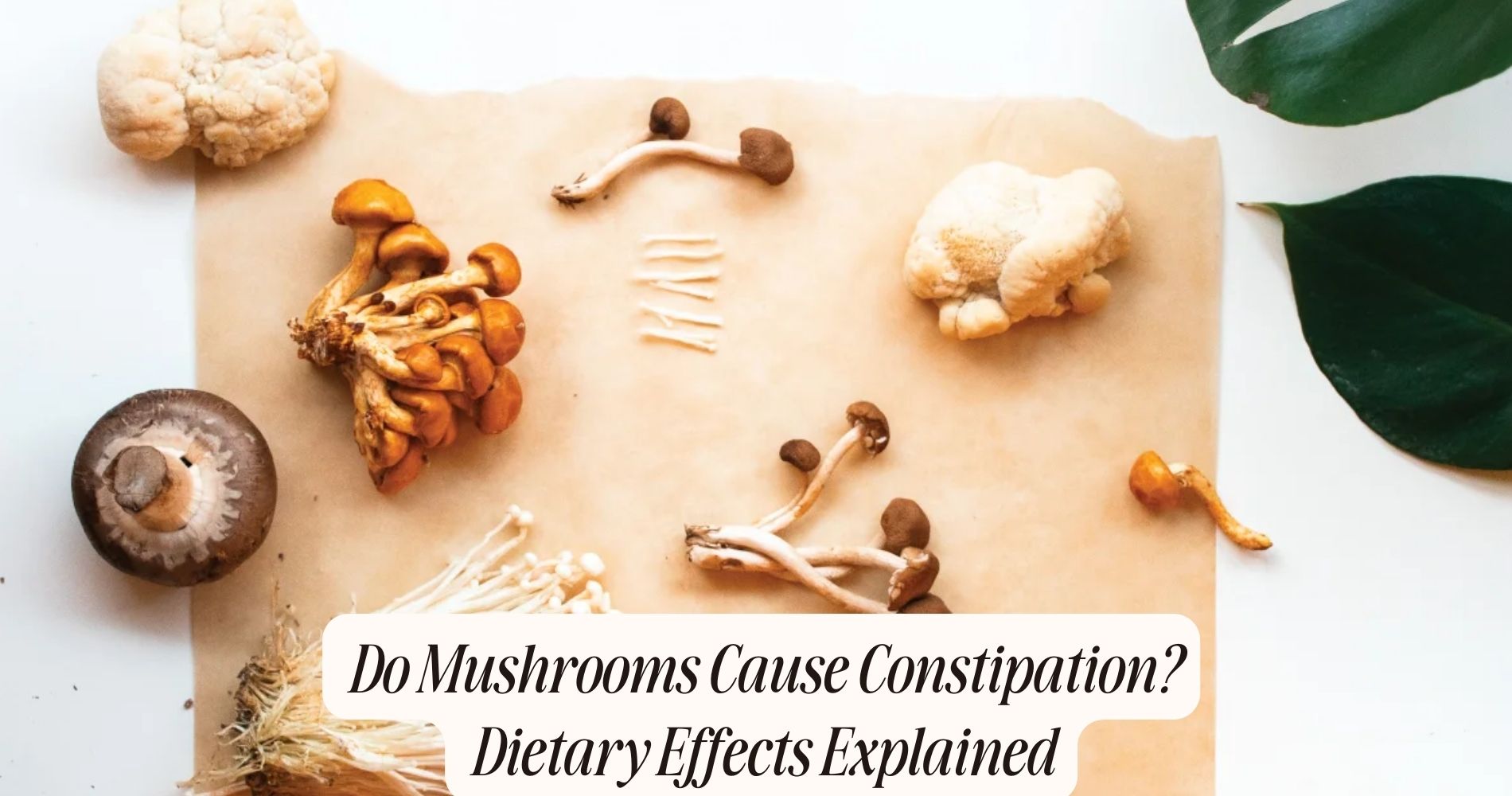
Do Mushrooms Cause Constipation? Dietary Effects Explained
Do mushrooms cause constipation? Mushrooms don't cause constipation; they actually help prevent it. Rich in both soluble and insoluble fibers, mushrooms enhance bowel movements and support overall digestive health. Soluble fiber softens stools, while insoluble fiber adds bulk, making stools easier to pass. Proper hydration while consuming mushrooms is essential for the fiber to work effectively. Additionally, their prebiotic fibers promote beneficial gut bacteria, further improving digestion and reducing gastrointestinal disorders. To uncover more truths and tips about incorporating mushrooms into your diet for peak digestive health, keep exploring.
Understanding Constipation
Constipation occurs when bowel movements become infrequent or difficult to pass, often causing discomfort and bloating. You might experience this condition for various reasons, making it essential to understand its primary causes.
One major factor is a lack of dietary fiber, which helps add bulk to your stool and promotes regular bowel movements. When your diet lacks sufficient fiber, stools can become hard and dry, making them difficult to pass.
Another common cause is inadequate fluid intake. Water helps soften stool, so if you're not drinking enough, you might find it harder to go. Additionally, a sedentary lifestyle can contribute to constipation. Regular physical activity helps stimulate intestinal function, and a lack of movement can slow down your digestive system.
Certain medications, such as opioids, antidepressants, and some antacids, can also lead to constipation. If you're taking any of these, consult your healthcare provider for alternatives or solutions.
Lastly, ignoring the urge to have a bowel movement can exacerbate the problem. When you delay, water continues to be absorbed from the stool, making it harder and more difficult to pass.
Understanding these constipation causes can help you take proactive steps to maintain regular bowel movements and improve your digestive health.
Nutritional Profile of Mushrooms
While often overlooked, mushrooms boast a nutritional profile rich in essential vitamins, minerals, and antioxidants. They're a great source of B vitamins such as riboflavin, niacin, and pantothenic acid. These vitamins play important roles in energy production and maintaining a healthy nervous system.
You'll also find that mushrooms are one of the few natural sources of vitamin D, which is essential for bone health and immune function.
In terms of mineral composition, mushrooms don't disappoint. They're packed with selenium, which has antioxidant properties that help protect your cells from damage. Potassium is another key mineral found in mushrooms, and it's necessary for maintaining proper heart and muscle function. Additionally, mushrooms contain copper, which aids in the production of red blood cells and supports overall cardiovascular health.

Antioxidants in mushrooms, such as ergothioneine and glutathione, are known to combat oxidative stress, potentially reducing the risk of chronic diseases. Including mushrooms in your diet can provide these beneficial nutrients, contributing to overall health and well-being.
Fiber Content in Mushrooms
In addition to their impressive vitamin and mineral content, mushrooms are also a remarkable source of dietary fiber, an important nutrient for digestive health. You mightn't immediately think of mushrooms as a high-fiber food, but they do contain a significant amount that can contribute positively to your diet.
Dietary fiber is essential for maintaining regular bowel movements and preventing constipation. One of the key mushroom benefits is their ability to act as effective fiber sources. On average, a cup of sliced raw mushrooms contains about 1 gram of fiber. While this might seem modest compared to other high-fiber foods, it's important to take into account the overall dietary context.

Adding mushrooms to a balanced diet that includes various fiber sources can help you meet your daily fiber requirements. Incorporating mushrooms into your meals can provide you with a well-rounded array of nutrients, including the fiber necessary for a healthy digestive system.
Given their versatility and ease of preparation, mushrooms can be a simple yet effective way to enhance your diet. So, don't hesitate to add this nutritious fungus to your culinary repertoire for improved digestive health.
Types of Fiber in Mushrooms
Mushrooms contain both soluble and insoluble fibers, each playing a distinct role in promoting digestive health. Soluble fiber dissolves in water and forms a gel-like substance in your gut. This type of fiber can help regulate blood sugar levels and lower cholesterol. In mushrooms, soluble fiber also aids in softening your stool, making it easier to pass, which is vital for preventing constipation.
On the other hand, insoluble fiber in mushrooms doesn't dissolve in water. Instead, it adds bulk to your stool and helps food pass more quickly through the stomach and intestines. This type of fiber is essential for maintaining regular bowel movements and preventing digestive issues like constipation.
Hydration and Digestion
To support effective digestion, you must prioritize hydration as an essential factor. Adequate water intake helps balance the fiber from mushrooms, ensuring smoother bowel movements.
Without enough fluids, fiber can actually contribute to constipation rather than alleviate it.
Water Intake Importance
Staying well-hydrated is essential for maintaining smooth digestive processes and preventing constipation. Adequate hydration levels guarantee that your digestive system functions at its best by softening stool and promoting regular bowel movements. When you don't get enough water, your body compensates by drawing water from the colon, leading to harder stools and constipation.
Water sources aren't limited to just drinking water. You can also maintain your hydration levels through various fluids such as herbal teas, soups, and even water-rich foods like cucumbers, oranges, and watermelon. Drinking these can be an effective way to keep your digestive system running smoothly.
Research supports the critical role of water in digestion. A study published in the American Journal of Gastroenterology found that individuals with higher fluid intake had a notably lower risk of constipation.
Additionally, the Mayo Clinic emphasizes that water helps break down food, allowing your body to absorb nutrients more efficiently.
Fiber and Fluid Balance
Balancing fiber and fluid intake is essential for ideal hydration and digestion, ensuring that your bowel movements remain regular and comfortable. An adequate intake of dietary fiber plays a critical role in forming stool bulk, which helps maintain regularity. Mushrooms, with their moderate fiber content, can contribute positively to this aspect of your diet.
However, consuming fiber alone isn't enough. You need to pair it with proper dietary hydration to prevent fluid imbalance. Fiber absorbs water, and without sufficient fluid intake, it could lead to hard, dry stools, making constipation more likely.
Drinking enough water helps soften the fiber-rich stool, facilitating smoother passage through your digestive system.
If your fluid intake is inadequate, you risk creating a fluid imbalance that could exacerbate constipation. Aim for a balanced approach: include fiber-rich foods like mushrooms in your diet, but don't neglect your water intake.
The combination of sufficient dietary hydration and fiber will promote excellent digestion and prevent constipation. Remember, maintaining this balance is key to supporting your digestive health and ensuring that your bowel movements remain consistent and comfortable.
Effects on Gut Microbiome
You'll find that mushrooms play a vital role in supporting your gut microbiome.
Their prebiotic fiber content helps nourish beneficial bacteria, boosting microbial diversity.
This balance is essential for maintaining overall gut health and alleviating constipation.
Prebiotic Fiber Content
Containing significant amounts of prebiotic fiber, mushrooms play an important role in promoting a healthy gut microbiome. As a fiber source, mushrooms offer prebiotic benefits, which means they help nourish the beneficial bacteria in your gut. These prebiotics, primarily found in the form of polysaccharides like beta-glucans, act as food for the good bacteria, encouraging their growth and activity.
When you consume mushrooms regularly, you're basically feeding your gut's beneficial bacteria, helping them thrive. This can contribute to improved digestion and overall gut health. Prebiotic fibers resist digestion in the upper gastrointestinal tract and reach the colon intact, where they ferment and produce short-chain fatty acids. These acids are important for maintaining the health of your colon and can help alleviate symptoms of constipation.

Research has shown that incorporating prebiotic fiber sources like mushrooms into your diet can enhance gut function and potentially reduce the risk of gastrointestinal disorders. By promoting the growth of beneficial bacteria, you're not just supporting digestion but also enhancing your immune system and reducing inflammation.
Microbial Diversity Boost
Consuming mushrooms can greatly enhance microbial diversity in your gut, promoting a healthier and more resilient gut microbiome. Mushrooms are rich in polysaccharides, which serve as prebiotics. These prebiotics nourish beneficial bacteria, encouraging a diverse range of microbial species. This diversity is important because it enhances the production of microbial enzymes, which are essential for breaking down complex carbohydrates and fibers that your body can't digest on its own.
Moreover, the unique compounds found in mushrooms foster positive bacterial interactions. When beneficial bacteria thrive, they help inhibit the growth of harmful pathogens, thus maintaining a balanced gut environment. The increase in microbial diversity also strengthens your gut's resilience, making it less susceptible to infections and imbalances.
Studies have shown that a diverse gut microbiome is linked to improved digestion, better immune function, and even mental well-being. By incorporating mushrooms into your diet, you're not just adding a tasty ingredient; you're actively supporting a healthier gut ecosystem.
This boost in microbial diversity can lead to more efficient nutrient absorption and a more robust digestive system overall. Therefore, mushrooms can be a valuable addition to your diet for enhancing gut health.
Gut Health Balance
In addition to boosting microbial diversity, mushrooms play a pivotal role in maintaining gut health balance by promoting the growth of beneficial bacteria and inhibiting harmful pathogens. This effect is essential for a well-functioning digestive system. When you consume mushrooms, you're not just adding a nutritious food to your diet; you're also enhancing the environment where beneficial bacteria thrive.
Research shows that mushrooms contain prebiotic fibers, which serve as food for these beneficial bacteria. These fibers help stimulate the production of digestive enzymes, which are vital for breaking down food and absorbing nutrients. This guarantees that your gut operates smoothly, reducing the likelihood of constipation.
Moreover, there's a significant gut-brain connection that can influence your overall well-being. A balanced gut microbiome can positively impact your mental health, mood, and even cognitive function. By incorporating mushrooms into your diet, you're supporting this intricate connection, promoting both physical and mental health.
Common Myths About Mushrooms
Many people mistakenly believe that mushrooms are difficult to digest and contribute to constipation. This myth may stem from misunderstandings about fungal taxonomy and the unique characteristics of mushrooms. Unlike plants, mushrooms are fungi, and their cellular structure includes chitin, a fibrous substance also found in the exoskeletons of insects. While chitin is indeed indigestible by humans, it doesn't necessarily cause digestive issues.
Let's debunk some common mushroom myths.
First, not all mushrooms are the same. There are thousands of species within fungal taxonomy, and their nutritional profiles can vary. Many edible mushrooms, such as button, shiitake, and oyster mushrooms, are rich in fiber, vitamins, and minerals, making them beneficial for digestion. The fiber content in these mushrooms can actually promote regular bowel movements rather than hinder them.

Second, the idea that mushrooms lead to constipation lacks scientific support. Studies show that the fiber in mushrooms can support gut health by promoting the growth of beneficial bacteria. This helps maintain a balanced digestive system.
Comparing Mushrooms to Other Foods
When comparing mushrooms to other foods, you'll find that their unique nutritional profile offers distinct advantages for digestive health. Mushrooms are low in calories and high in fiber, making them an excellent choice for maintaining regular bowel movements. They contain both soluble and insoluble fibers, which help soften stool and promote gut motility. This is a significant benefit when contemplating dietary comparisons with other food alternatives that may be lower in fiber.
In contrast, foods like red meat and dairy products can be harder to digest and often lack the fiber necessary to prevent constipation. Even some fruits and vegetables, while nutritious, don't always offer the same balance of fiber types found in mushrooms. Additionally, mushrooms contain polysaccharides, which have been shown to support gut flora, further enhancing digestive health.
Moreover, mushrooms are rich in essential nutrients like B vitamins, selenium, and antioxidants, which contribute to overall well-being. This makes them not just a fiber source but a multifaceted food that supports various bodily functions.
Tips for Including Mushrooms in Diet
To effortlessly incorporate mushrooms into your diet, start by adding them to your favorite salads, soups, and stir-fries. These versatile fungi enhance both flavor and nutrition. For salads, slice raw mushrooms thinly for a crunchy texture.
In soups, simmer them with vegetables and broth, allowing their earthy flavors to meld seamlessly. Stir-fries benefit from mushrooms' ability to absorb sauces, making each bite more flavorful.

When considering cooking methods, sautéing, grilling, and roasting are excellent choices. Sauté mushrooms in olive oil or butter for a rich, savory taste. Grilling them enhances their natural umami, while roasting brings out a deeper, caramelized flavor. Each method preserves their nutritional benefits, including fiber content, which aids digestion and prevents constipation.
Pairing suggestions can elevate your mushroom dishes. Combine mushrooms with leafy greens, nuts, and dried fruits in salads for a nutrient-packed meal. In soups, pair them with root vegetables like carrots and parsnips for a hearty, fiber-rich option.
For stir-fries, mix them with lean proteins like chicken or tofu and vibrant vegetables like bell peppers and broccoli.
Frequently Asked Questions
Can Mushrooms Be Eaten by Individuals With Irritable Bowel Syndrome (Ibs)?
Yes, you can eat mushrooms if you have IBS. Their fiber content and nutrient profile generally support digestive health. However, individual tolerance varies, so monitor your symptoms and adjust your intake accordingly.
Are There Any Specific Mushroom Varieties That Are Harder to Digest?
Certain mushroom varieties, like shiitake and portobello, might be harder to digest due to their higher fiber content. Your body may require more digestive enzymes to break them down, potentially causing digestive discomfort for some people.
How Do Cooking Methods Affect the Digestibility of Mushrooms?
Cooking temperature and preparation techniques greatly impact mushroom digestibility. High cooking temperatures can break down tough cell walls, making them easier to digest. Proper preparation techniques, like slicing thinly, also improve their digestibility.
Can Mushrooms Be Included in a Low-Fodmap Diet?
You can include mushrooms in a low-FODMAP diet. They offer nutritional benefits without triggering gut symptoms. Mushrooms support a healthy gut microbiome by providing essential nutrients and prebiotics, promoting overall digestive health.
Are There Any Potential Allergic Reactions to Mushrooms That Affect Digestion?
Yes, you might experience allergic inflammation from mushrooms, impacting digestion. Symptoms include nausea or stomach cramps. This occurs because your body may react to proteins in mushrooms, potentially disrupting your digestive enzymes and causing discomfort.
Conclusion
Incorporating mushrooms into your diet won't cause constipation. They're rich in dietary fiber, which aids digestion and supports a healthy gut microbiome.
While myths suggest otherwise, evidence shows mushrooms are beneficial when consumed with adequate hydration.
Compared to other foods, mushrooms offer a balanced fiber profile, making them a great addition to your meals.
So, don't hesitate to enjoy mushrooms as part of a varied, nutritious diet for overall digestive health.




